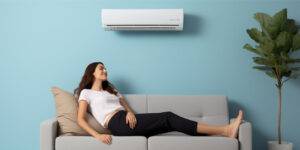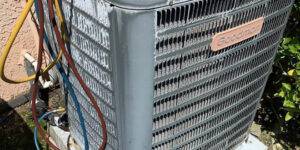In Tampa Bay, FL, where the climate can contribute to indoor air quality challenges, modern HVAC technology plays a crucial role in maintaining a healthy living and working environment. Discover how advancements in HVAC systems can significantly reduce indoor air pollution in your home or business.

The Role of HVAC in Reducing Indoor Air Pollution
Indoor air pollution can stem from various sources, including dust, pollen, mold spores, pet dander, and volatile organic compounds (VOCs). Effective HVAC systems are vital in minimizing these pollutants, ensuring the air you breathe indoors is clean and healthy.
Advanced Filtration Systems
- HEPA Filters: High-Efficiency Particulate Air (HEPA) filters can trap 99.97% of particles that are 0.3 microns or larger, effectively removing dust, pollen, and other allergens from the air.
- Activated Carbon Filters: These filters are excellent at absorbing gasses and odors, including VOCs from paints, furniture, and cleaning chemicals, making the air fresher and reducing health risks.
Humidity Control
- Dehumidifiers: Integrated into HVAC systems, dehumidifiers help control moisture levels in your home. By maintaining optimal humidity, they prevent mold growth and dust mite proliferation, both of which are common indoor air pollutants.
- Humidifiers: In drier climates or seasons, humidifiers add necessary moisture to the air, preventing dryness that can exacerbate respiratory problems and irritate mucous membranes.
UV Light Purifiers
- Ultraviolet (UV) Lamps: Installed within the HVAC system, UV lamps can kill bacteria, viruses, and mold that may pass through filters, providing an additional layer of air purification and reducing the spread of airborne diseases.
Ventilation Improvements
- Energy Recovery Ventilators (ERV): These systems exchange stale indoor air with fresh outdoor air, ensuring adequate ventilation without significant energy loss. ERVs are particularly effective in tightly sealed buildings, where indoor air pollutants can accumulate.
Smart HVAC Systems
- Automated Air Quality Monitoring: Modern HVAC systems can be equipped with smart technology that continuously monitors indoor air quality, adjusting settings automatically to optimize air purification and ventilation based on real-time data.
Regular Maintenance and Upgrades

- Professional Maintenance: Regular check-ups and maintenance by HVAC professionals ensure your system operates efficiently, with clean filters and properly functioning components to keep indoor air quality at its best.
- System Upgrades: Upgrading to an HVAC system with advanced air purification features can make a significant difference in reducing indoor air pollution.
The Importance of Indoor Air Quality and Its Impact on Your Health
Indoor air quality (IAQ) is a critical aspect of our living and working environments that often goes unnoticed, yet it has a profound impact on our health, comfort, and well-being. Given that most people spend a significant portion of their time indoors, the air quality within homes, offices, and other buildings can influence our health in several ways.
Health Impacts of Poor Indoor Air Quality
- Respiratory Problems: Exposure to pollutants like dust, pet dander, pollen, and mold spores can aggravate existing respiratory conditions such as asthma and allergies and can lead to the development of new respiratory issues.
- Headaches and Fatigue: Poor IAQ can cause headaches, dizziness, and fatigue, reducing productivity and overall quality of life.
- Long-term Health Risks: Long-term exposure to certain air pollutants, including volatile organic compounds (VOCs) and radon, can lead to more serious health issues, including heart disease and cancer.
- Compromised Immune System: Continuous exposure to poor indoor air can weaken the immune system, making individuals more susceptible to various infections and diseases.
Factors Affecting Indoor Air Quality
- Ventilation: Inadequate ventilation can increase indoor pollutant levels by not bringing in enough outdoor air to dilute emissions from indoor sources and by not carrying indoor air pollutants out of the area.
- Humidity Levels: High humidity can contribute to mold growth and increase concentrations of dust mites and other allergens. Low humidity can irritate the respiratory tract and eyes.
- Indoor Pollutants: Sources such as building materials, furnishings, household cleaning products, personal care products, and indoor activities like cooking and heating can release pollutants more or less continuously.
Enhancing Indoor Air Quality
Improving indoor air quality involves several strategies, including:
- Proper Ventilation: Ensuring adequate ventilation with clean outdoor air can significantly reduce indoor air pollutants. Use of energy recovery ventilation systems can help make this process more energy efficient.
- Controlling Humidity: Maintaining indoor humidity levels between 30% and 50% can help reduce the presence of mold and dust mites.
- Regular Cleaning: Frequent vacuuming, dusting, and cleaning of surfaces can minimize the accumulation of dust, pet dander, and other particulates.
- Air Purification: Using air purifiers with HEPA filters can capture a significant amount of airborne particles, and activated carbon filters can remove gasses and odors from indoor air.
- Source Control: Eliminating or reducing the sources of pollutants (e.g., choosing low-VOC products, ensuring gas stoves are well-vented) can dramatically improve IAQ.
Understanding the importance of indoor air quality and taking proactive steps to improve it can lead to better health outcomes, enhanced comfort, and a more enjoyable living and working environment. By addressing the factors that contribute to indoor air pollution, individuals can protect themselves and their families from the adverse health effects associated with poor indoor air quality.
FAQ About Indoor Air Pollution
What causes indoor air pollution?
Indoor air pollution can be caused by a variety of sources, including tobacco smoke, household cleaning products, building materials, furniture, heating appliances, damp carpets, and outdoor pollution entering the home. Activities like cooking and painting can also contribute to indoor air pollution.
What are common indoor air pollutants?
Common indoor air pollutants include volatile organic compounds (VOCs), mold, dust mites, pollen, pet dander, carbon monoxide, radon, and particulate matter. Each of these can have various sources and can impact health differently.
How does indoor air pollution affect health?
Indoor air pollution can lead to immediate effects like headaches, dizziness, fatigue, and irritation of the eyes, nose, and throat. Long-term exposure can result in respiratory diseases, heart disease, and even cancer. It can particularly exacerbate conditions for those with respiratory and cardiovascular conditions.
How can I test my home for indoor air pollution?
You can use indoor air quality (IAQ) monitors to measure levels of certain pollutants like VOCs, particulate matter, and carbon dioxide. For specific pollutants like radon, you may need a specialized test kit. Professional indoor air quality assessments are also available.
Can plants help improve indoor air quality?
Yes, certain indoor plants can help improve air quality by absorbing pollutants like carbon dioxide and releasing oxygen. However, their overall effectiveness in significantly purifying indoor air across a home is limited. They should be used in conjunction with other air purification methods.
How often should I ventilate my home to improve indoor air quality?
Ventilating your home by opening windows and doors should be done daily if possible, especially during activities that can increase indoor pollutants, such as cooking or cleaning. The duration can depend on outdoor air quality and weather conditions.
What is the best way to improve indoor air quality?
The best way to improve indoor air quality includes a combination of strategies: ensuring proper ventilation, using air purifiers with HEPA filters, maintaining optimal humidity levels, regularly cleaning to reduce dust and allergens, and minimizing the use of products that emit VOCs.
Are air purifiers effective against indoor air pollution?
Yes, air purifiers, especially those with HEPA filters, can be effective in capturing a significant amount of airborne particles, including dust, pollen, and pet dander. Purifiers with activated carbon filters can also help reduce odors and gasses.
How does humidity affect indoor air quality?
Both high and low humidity levels can negatively impact indoor air quality. High humidity can encourage the growth of mold and dust mites, while low humidity can cause respiratory irritation and discomfort. Maintaining humidity levels between 30% and 50% is ideal for indoor air quality.
What steps can I take to reduce indoor air pollution in my home?
- Use exhaust fans in bathrooms and kitchens to remove moisture and gasses.
- Choose household products that emit fewer VOCs.
- Regularly clean and vacuum to reduce dust and allergens.
- Ensure your home has adequate ventilation.
- Consider using an air purifier in areas with high pollutant levels.
- Test for radon and fix if there’s a problem.
- Maintain heating and cooling systems and change filters regularly.
Improving indoor air quality requires awareness and proactive measures to reduce pollutants and ensure a healthy living environment.
Breathe Easier with Advanced HVAC Solutions 🍃💨
Indoor air quality is a priority for everyone, especially in Tampa Bay, FL, where the climate can contribute to air quality issues. Heatwave Heating & Cooling is at the forefront of providing advanced HVAC solutions tailored to improve indoor air quality. From state-of-the-art filtration systems to smart HVAC technologies, we’re here to ensure your indoor environment is healthy, comfortable, and pollution-free. Let us help you breathe easier and enjoy a cleaner indoor air experience. Reach out today for a consultation and take the first step towards a healthier indoor environment with Heatwave Heating & Cooling.
